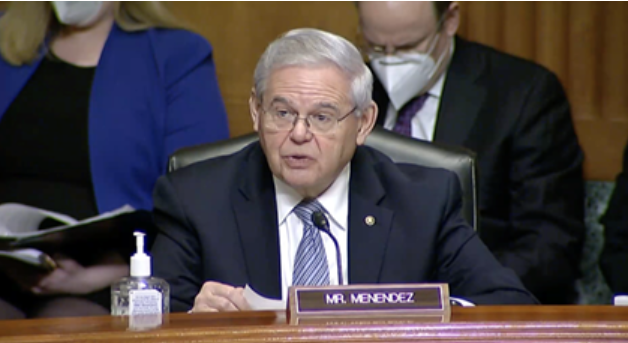VIDEO: Menendez Continues to Push for Improved Customer Service and Accountability at the IRS

VIDEO: Menendez Continues to Push for Improved Customer Service and Accountability at the IRS
WASHINGTON, D.C. – U.S. Senator Bob Menendez (D-N.J.), a senior member of the Senate Finance Committee that oversees the Internal Service Revenue (IRS), today continued his push for improved services at the IRS as the agency faces massive processing backlogs. The hearing comes amidst a slew of bicameral letters led or co-led by Senator Menendez urging the agency to address its many customer services issues
“Throughout 2021 during the 2020 filing season, tens of millions of taxpayers have been forced to wait extraordinarily long periods of time for the IRS to perform the most basic of functions—including processing their tax returns, issuing their refunds, and addressing their correspondence,” Sen. Menendez said. “The IRS touches more Americans than any other entity, public or private. We have to have an IRS that works.”
“That is why I have led or co-led six letters in the last five months encouraging the IRS to work down its unprecedented backlog and improve its customer service,” the Senator added.
During the hearing, Senators heard from Erin Collins, the National Taxpayer Advocate; Jessica Lucas-Judy, Director of Strategic Issues for the U.S. Government Accountability Office (GAO); and Jan Lewis, Chair of the Tax Executive Committee, American Institute of CPAs (AICPA) – all of whom described a system that needed immediate and long-term solutions.
Of particular concern by Senator Menendez and the hearing’s witnesses are the automatic notices taxpayers are receiving from the IRS despite their unprecedented backlog – including ones threatening the garnishment of social security benefits. Senator Menendez again reiterated his call for the IRS to get back to doing basic functions well: opening the mail, processing returns, and answering phone calls.
Even before the onset of the COVID-19 pandemic in March 2020, the IRS has struggled with funding and personnel issues for over a decade. Between 2010 and 2019, the agency’s budget declined by $2.9 billion or 20.4 percent. This, combined with a reduction in nearly one-fourth of its workforce, created a “perfect storm” leading up to the COVID-19 pandemic in March 2020.
Following the onset of the pandemic, the IRS closed all of its processing facilities for almost three months and delayed the close of the 2020 filing season, leading to a backlog of 13.1 million unprocessed tax returns at the end of 2020, according to the U.S. Government Accountability Office (GAO). According to the National Taxpayer Advocate, as of January 28, 2022, the IRS has 23.7 million items to process manually, including 17.9 million unprocessed returns and 5.8 million pieces of mail.
Sen. Menendez has long been sounding the alarm about customer service performance and the agency’s massive processing backlogs. Today, Sen. Menendez and Rep. Abigail Spanberger (D-Va.-07) led a bicameral effort with 45 colleagues urging the IRS to take immediate actions to reduce its massive backlog and improve its customer service during the 2022 tax filing season. Sens. Menendez and Cortez Masto today led another letter calling on the IRS to halt its planned closure of the Austin tax processing center, given how it would impact ITIN applicants and recipients.
Earlier this week, Sen. Menendez led a group of colleagues in urging the agency to address concerns about any continued involvement between the IRS and ID.me, an online identity network that taxpayers can use to access government services. The senators expressed particular concern with the disproportionate harm such facial recognition technology can have on minority and low-income communities.
Last month, he led more than 200 colleagues in a bipartisan and bicameral call for the IRS to provide penalty relief for taxpayers. This spurred the agency to address some of the most painful issues facing taxpayers by temporarily halting some, but not all of the penalty notifications. Sen. Menendez also urged IRS Commissioner Rettig last year to keep phone lines open while addressing the unprecedented backlog of unprocessed returns and to take concrete steps that will allow them to return back to basics such as answering phones, providing quality online and in-person services, and processing returns in a timely manner.










